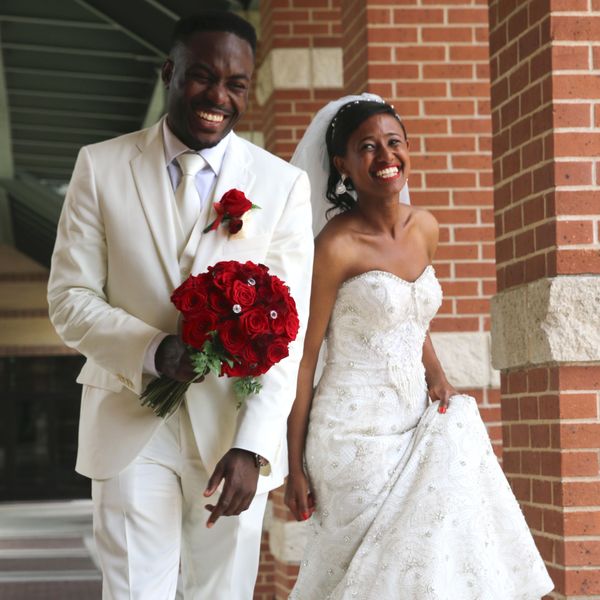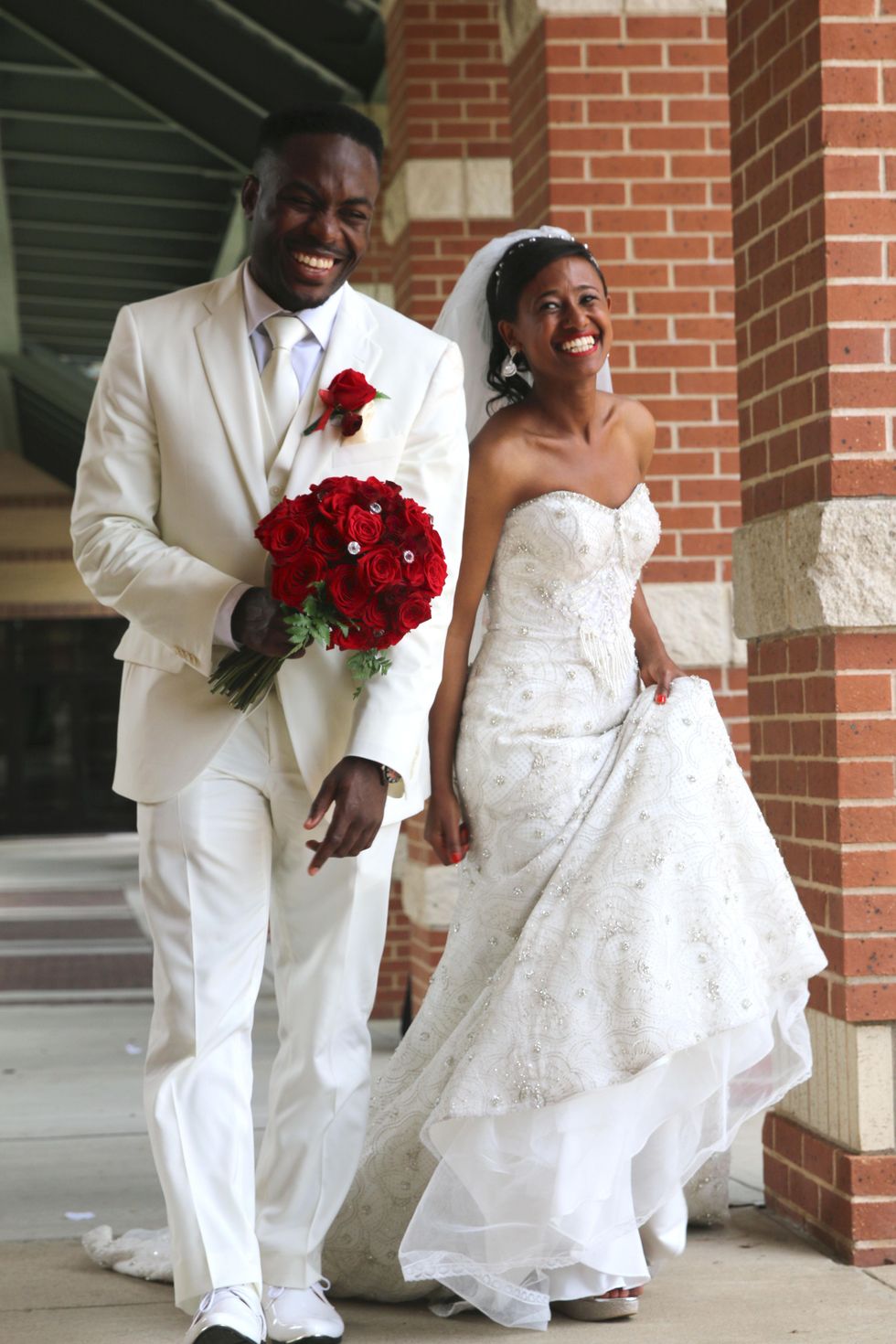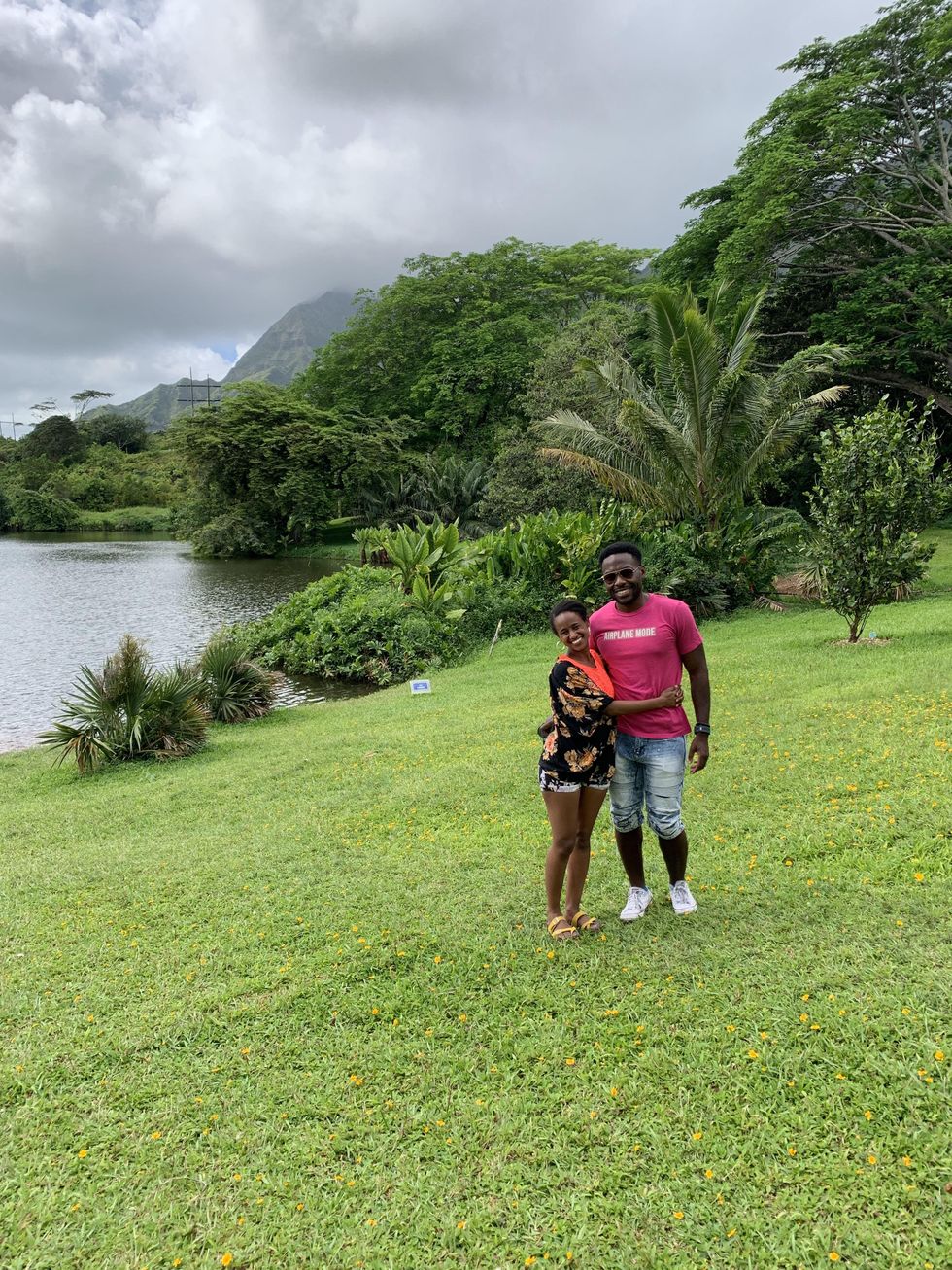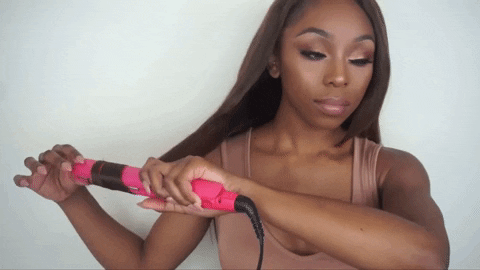Why This Intercultural Couple Chooses Faith As The Foundation In Their Marriage

In xoNecole's Our First Year series, we take an in-depth look at love and relationships between couples with an emphasis on what their first year of marriage was like.
For Billboard-charting hip-hop artist Call Me Ace, he met his match when he met his now-wife, attorney Roza Patterson, at his college birthday party. On this particular night, in 2011, Ace and Roza shared with each other their ambitions and their dreams after college. With both of them living in two different states, they had no idea that the strength of their connection would withstand the physical distance between them.
According to Ace, what drew him to Roza was the fact that "she loves so much. She has taught me to be less self-centered." For Roza, "it's the way he celebrates other people. He is so supportive of others." This couple maintained their long-distance love until they finally walked down the aisle in 2016.
For Roza and Ace, this month marks their five-year anniversary and they have centered their marriage in being aligned spiritually and purposefully. With combining their Jamaican and Ethiopian cultures, Ace and Roza made it their mission to build together in love and serve each other to reach the ultimate #RelationshipGoals. With Ace being an artist, his recent song "Love Goals" talks about the core principles of his marriage, and how he and Roza continue to work hard and trust in God to take them to the top.
When you love someone, having faith as your foundation helps you get through the best of times and the worst of times. Ace mentions, "Instead of thinking of these instances as negative, we took these moments as opportunities to help build together in this project called marriage." Whether you are married, engaged, or in the beginning stages of dating, a partnership is about togetherness. It highlights the importance of focusing on the journey of love and trusting that your faith will guide you to the ultimate destination.

Courtesy of Ace and Roza
In this installment of xoNecole's "Our First Year", Ace and Roza share how they kept their love alive during long-distance, how they keep God as their foundation, and truly support each other's dreams in their marriage.
Here's their story:
How They Met
Ace: I recently graduated from Columbia University and was having a birthday party on campus. A mutual friend of ours attended the party and Roza came with [the mutual friend]. My first impression of Roza was I thought she was a literal angel. I never met anyone like her. I was fresh out of college and I didn't have much. So after talking to Roza for a while, I compared what she was doing with her life versus where I was in my life. I couldn't even be her friend because I figured I was going to mess up her life (laughs). My attitude was that she was doing so great for herself, so she should just leave me or she would regret it (laughs).
Roza: I really didn't know anyone at the party. So to make myself more comfortable, I figured I would talk to the birthday boy. We basically talked all night and we exchanged social media information. Ace was definitely the most interesting person I talked to that night. When I met Ace, I thought he was a good listener. At the time, I recently got out of a relationship, so I wasn't looking to hop into another one. Even though I liked talking with him, I really didn't think anything would happen between us.
The One
Roza: When I met Ace, I had made a commitment with the Lord that I would not take action into anything unless hearing from the Lord first. A lot of people say "when you know you know" and for me I patiently waited for the Lord to tell me that Ace was my person. When the moment finally happened, it was all excitement from then on out.
Ace: Roza and I were long-distance the entire time before we got married. At a point in our relationship, Roza had a choice to choose between Columbia [my alma mater] or a school in the UK. She chose the school in London. I was mad at the situation because I took it as a sign that we weren't meant to be together.
But one day, while I was praying and writing in my journal, I heard this question, "Has Roza wronged you in any way? If so, leave. But if not, you should love her through this." I took that as a sign that if this is God's will, then so be it. So after Roza's Master's program was over, I was convinced that if we can make it through an international long-distance relationship, we can make it through anything.
"A lot of people say 'when you know you know' and for me I patiently waited for the Lord to tell me that Ace was my person. When the moment finally happened, it was all excitement from then on out."

Courtesy of Ace and Roza
The Big Day
Roza: One thing I do remember on our wedding day is that Ace actually surprised me with a song. I was completely shocked (laughs). Ace and I planned our wedding to a T. But after our first dance, I see the DJ walking over with the mic. I'm telling the DJ we don't need the mic, it's fine (laughs). But little did I know, Ace started performing his song and I was blown away. Ace told me when we were planning the wedding that he didn't want me to stress and that his job was to make me happy. He definitely did that.
Ace: One thing I remember is that when the wedding was all done, we ran into another married couple. They had this huge white old-school car and Roza and I asked if we could take a picture with them and their buggy. Then, we were slick and got them to take our picture by ourselves in front of their car (laughs). It was one of the dopest pictures ever.
Early Challenges
Roza: When Ace graduated from Columbia, he started at an unpaid internship. In my head I thought, 'Who starts an unpaid internship after college, we need to be getting jobs.' (laughs). So basically, he didn't have any money. I started to wonder if he would be able to provide for me in the future. I struggled with this and even thought about giving up on our relationship. But I am glad the Lord worked with me on that. I value security and I believe everyone does. But finances is not what I wanted to base our relationship on. In the end, he is providing for me more than I can ever imagine now. So I am glad I let go of that.
Ace: So the challenges as far as culture, what we like to eat, or different sleeping patterns hit us after we got married. But for us, it wasn't really a challenge per se. It was actually pretty fun. We have never lived together before, so it was all new for us and we were able to experience everything for the first time together. Instead of thinking of these instances as negative, we took these moments as opportunities to see how we build together in this project called marriage.
Biggest Fears
Ace: My biggest fear, and I am still working through this, I just want to be a good husband. In the beginning, I feared that our relationship would crumble because of me. The way I grew up, I didn't have a lot of role models on what a healthy black relationship looked like. All of it was new for me and even my family. So there's this pressure to not mess things up. But I submit my fears to the Lord and it is an everyday choice to trust in God and lead in loving one another.
Roza: One of my biggest fears was that we had different upbringings. I am Ethopian-American and he's Jamaican. My other siblings married other Ethiopians, so I was scared about how our different cultural backgrounds would blend together. I struggled between if my family would accept him or if I should do what my siblings did, because that's easier.
But God is so gracious, because I learned that above anything, you and your partner comes first. If I would have listened to those fears, I would have lost out on this amazing man and our beautiful marriage. When you are with someone that you know you love, don't use money, looks, culture, etc. as an excuse to break that up.
"If I would have listened to those fears, I would have lost out on this amazing man and our beautiful marriage. When you are with someone that you know you love, don't use money, looks, culture, etc. as an excuse to break that up."

Courtesy of Ace and Roza
Love Lessons
Ace: One of the scriptures in the Bible, it says love doesn't demand its own way. I think that is so powerful because in marriage, we are both individuals with our own perspectives. So it is not about living your life your own way anymore. It is about how we mend things together into one. One of the ways we keep our marriage intact is we have these relationship summits. We are working on a better name for them (laughs).
Every quarter, we travel somewhere and take a couple of days to sit and talk. Whatever are the hot topics in our marriage during that time, we have a chance to talk them through and our goals moving forward. This is really our safe space for one another to lay everything out on the table and the other person's job is to actively listen. I am really thankful for those times.
Roza: One of the lessons I have learned is that you can not treat love as a feeling. In marriage, love is action. Love translates through service. You can give without loving, but you can't love without giving. With that said, it's important to remind yourself that there are times you will show you love your partner whether you feel like it or not. I have to show up no matter what for my teammate.
"One of the lessons I have learned is that you can not treat love as a feeling. In marriage, love is action. Love translates through service."
Best Advice
Ace: A happy wife is a happy life. Period (smiles).
Roza: The only competition in your marriage is to see who can outserve each other. Marriage should not be for tit for tat. You should be serving your partner simply because that is what you are called to do.
For more of Ace and Roza, follow them on Instagram @rozapatterson and @callmeacelegit. You can also check out Ace's most recent album, Out of Office, here.
Featured image courtesy of Ace and Roza
This Is How To Keep 'Holiday Season Stress' From Infecting Your Relationship
Hmph. Maybe it’s just me, but it seems like there is something really weird happening in the fall season air (because winter doesn’t officially begin until December 21) that cuddle season is in full swing while break-up season is as well. In fact, did you know that break-ups are so popular during the holiday season that December 11 is deemed Break-Up Day?
The reasons why relationships shift around this time vary; however, I did both roll my eyes and chuckle when I read that a very popular one is because it’s an easy way to get out of getting one’s significant other a Christmas present. SMDH.
Anyway, I personally think that the less shallow folks out here may contemplate calling things “quits” or they at least distance themselves a bit from their partner (and what I’m referring to is serious relationships) due to all of the stress and strain that oftentimes comes with the holidays whether it be financial, familial, due to their tight schedules or something else.
Listen, I would hate for you and your man to miss the fun and happiness of experiencing this time of year, all because you are so overwhelmed or irritated that you can’t really enjoy it. That’s why I have a few practical tips for how to avoid allowing the typical holiday season stress from INFECTING your relationship.
Manage Your Expectations
 Giphy
GiphyUnmanaged expectations. If there is a main reason why the holiday season tends to be so stress-filled for so many people, I’d bet good money that this is the cause. And when you’re in a long-term relationship, expectations can manifest themselves in all sorts of cryptic and/or unexpected ways. You might have relatives who assume that you are going to be with them for Thanksgiving or Christmas when you have other plans in mind. You might be thinking that you are going to spend one amount for presents while your man is thinking something totally different. When it comes to scheduling, your signals may be crossed.
And you know what? To all of these scenarios, this is where clear and consistent communication come in. Don’t assume anything. Don’t dictate anything either. From now until New Year’s, mutually decide to check in once a week, just to make sure that you are both on the same page as it relates to the holidays and what you both are thinking will come along with it. The less blindsided you both feel, the less stressed out you will be. Trust me on this.
Set (and Keep) a Budget
 Giphy
GiphyOkay, so I read that last year, 36 percent of Americans incurred some type of holiday-related debt. Hmph. Last year, there was still some sense of normalcy in this country, chile, so I can only imagine what finances are gonna look like over the next several weeks. That said, since I don’t know a lot of people who don’t find being broke stressful, make sure that you and your bae set a budget and then stick to it this year — no ifs, ands or buts.
Because really, y’all — it doesn’t make sense to deplete savings and/or max out credit cards for a few days of giggles only to be damn near losing your mind because you don’t know how to make ends meet come Dr. Martin Luther King, Jr. Day.
And by the way, this tip doesn’t just speak to things like food and gifts; I also mean travel. If it doesn’t make a ton of sense (or cents) to be all over the place this year — DON’T BE.
Keep Matthew 5:37 at the Forefront
 Giphy
GiphyIf off the top of your head, you don’t know what Matthew 5:37 says, no worries, here ya go: “But let your ‘Yes’ be ‘Yes,’ and your ‘No,’ ‘No.’ For whatever is more than these is from the evil one.” That verse right there? Oh, it’s a boundaries lifesaver! I say that because do you see “maybe” or “I’ll think about it” in there? Nope. LOL. It says that you should tell people “yes” or “no” and leave it at that — and that complements Anne Lamott’s quote, “’No’ is a complete sentence” impeccably well. Yeah, you’ve got to remember that anything beyond a yes or no to a request is privileged information; you don’t owe anyone details or an explanation.
Besides, if you are really honest with yourself, when someone asks you something and you give a “Umm, let me think about it” kind of reply, more times than not, you already know what your answer is going to be — so why not let you both off of the hook? Give your response. Commit to that. And let everyone (including yourself) get on with their lives and schedules.
I promise you that when it comes to those holiday parties, you are pissing more folks off by not RSVP’ing or doing so and not showing up than just saying, “Thank you but not this year” off the rip.
Remember That Your Personal Space Is Privilege Not a Right
 Giphy
GiphyA friend of mine recently bought a new house and invited me over to come see it. He’s a single man with no children, so as I was taking in all of the space that he had, especially as I walked through his finished basement, I joked about relatives coming to live with him. “Hell no” and “absolutely not” were pretty much his immediate responses as he went on to say that some folks even had the nerve to be offended when he told them that he had no intentions on taking DNA in.
Ain’t it wild how people think that your stuff is their right? And yes, that brings me to my next point. Your home is your sanctuary space. If you want to host folks this year — cool. If not, ALSO COOL. Please don’t let folks (family included) guilt you into how they want you to act or even into what they would do if the shoe was on the other foot. You are not them — and as one of my favorite quotes states, “If two people were exactly alike, one of them would be unnecessary.” (A man by the name Larry Dixon said that.)
Hell, my friends? They know that I am good for sending them random things that they need or even want all throughout the year. Coming over to hang out at my pace, though. Uh-uh. Chalk it up to being a card-carrying member of the ambivert club yet I like keeping my living space personal — and I sleep like a baby, each and every night, for feeling that way.
Always remember that your space, your time, your resources, your energy and shoot, yourself period (including your relationship), are all things that are your own. You get to choose how, when and why you want to share them. The holiday season is certainly no exception.
Cultivate Some “You Two Only” Traditions
 Giphy
GiphyIt’s not uncommon for some couples to hit me up after the holiday season to “detox.” Sometimes it’s due to the financial drama (and sometimes trauma) that they experienced. Sometimes it’s because they allowed their relatives (especially in-laws) to get more into their personal business than they should’ve. More than anything, though, it tends to be because they didn’t get enough quality time together and so ended up feeling “disconnected.”
Please don’t let that happen. Listen, I’m not even a holidays kind of woman and yet, I will absolutely sit myself down with some hot chocolate and chocolate chip cookies to enjoy a Hallmark holiday film or two. Aside from the fact that most of them are lighthearted and sweet, I also like that they usually focus on couples loving on each other amidst all of the holiday beauty and ambiance — which is something that all couples should set aside some time to do.
Maybe it’s a vacation. Maybe it’s a staycation. Or maybe it’s my personal favorite, A SEXCATION. Whether it’s for a few days, the weekend or even overnight — don’t you let the holidays go by without setting aside time for you and your man to celebrate one another. Don’t you dare (check out “Are You Ready To Have Some Very Merry 'Christmas Sex'?”).
GET. SOME. REST.
 Giphy
GiphyI once read that 8 out of 10 people get stressed out over the holidays and 3 out of 10 lose sleep during to it — and when you’re stress-filled and sleep-deprived, that can absolutely lead to hypersensitivity, making mountains out of molehills and even not being in the mood for sex.
Your relationship can’t afford to go through any of this, so definitely make sure to prioritize rest. I don’t care how unrealistic it might seem during this time, sleep should never be seen as a luxury; it will always and forever be a great necessity.
That said, try to get no less than six hours of shut-eye in (check out “6 Fascinating Ways Sex And Sleep Definitely Go Hand In Hand”) and even ask your bae to take a nap with you sometimes (check out “Wanna Have Some Next-Level Sex? Take A Nap, Sis.”). Not only will sleep help to restore your mind, body and spirit but, when it’s with your partner, it’s an act of intimacy that can make you both feel super connected, even in the midst of what might feel like chaos.
___
Holiday season stress is real. Still, never give it the permission or power to throw your relationship off. Put you and your man first and let the holidays be what they are gonna be, chile.
Let’s make things inbox official! Sign up for the xoNecole newsletter for love, wellness, career, and exclusive content delivered straight to your inbox.
Featured image by Shutterstock
It’s probably been over the past 2-3 years that I’ve become hyper-focused when it comes to applying certain chemical exfoliants known as acids to my skin. Personally, I’ve come to really appreciate ones like mandelic acid and hyaluronic acid because they have a way of softening my skin, brightening it up and really evening out my complexion overall.
In fact, on my skin, they have been so effective that they have caused me to wonder what would happen if I applied some of them to my hair too — and boy, was it an experiment that paid off big time!
If, while on your continual journey to get the best out of your own tresses, you’d like to learn how to get them healthier than it’s ever been, I’ve got seven acids that are typically known for skin use that can be just as beneficial to your hair as well.
1. Salicylic Acid
When it comes to your skin, salicylic acid is beta-hydroxy acid that is great for your skin if you’re looking for something that will exfoliate it, clear out your pores and dissolve dead skin cells. In fact, this is why it’s an acid that is quite popular when it comes to treating acne.
Your hair will enjoy salicylic acid because, if you’re looking to remove product build-up, you want to soothe an itchy or irritated scalp or you’ve got some dandruff flakes that are totally driving you up the wall, salicylic acid has the ability to treat all of this. Either purchasing a shampoo that contains this ingredient or adding it to your favorite scalp scrub is probably the most effective way to get the most out of it.
Just make sure that if your scalp is sensitive or dry that you approach with caution. In these instances, it could end up irritating your scalp more than helping it out, so use a very little bit in the beginning to make sure that it vibes with you.
2. Lactic Acid
Lactic acid is an alpha hydroxy acid that can help to even out your skin tone as well as slow down the signs of aging. The properties in it help to do this by reducing hyperpigmentation and boosting collagen production in your skin as well as keeping it hydrated.
Why is it great for your locks? For one thing, lactic acid is considered to be a humectant. This means that it pulls water from the air so that your hair is able to remain moisturized.
Another thing that makes it a winner is the fact that lactic acid breaks down dead skin cells on your scalp (so that your hair follicles are able to flourish), it can help to soften and detangle your hair (making it a helpful addition on your wash days) and it also helps to protect your tresses from heat styling tools and UV damage. Applying a hair rinse that’s made up of part lactic acid and part water can work wonderfully (so long as you apply it once a month, tops; more than that might be too “intense” for your hair strands).
3. Glycolic Acid
Glycolic acid is a water-soluble alpha hydroxy acid that is actually made from sugar. Your skin will adore it because it smooths the appearance of fine lines and wrinkles, improves the texture of your skin, gently exfoliates, clears your pores and brightens up your complexion overall.
The reasons why you should consider this acid for your hair is because it helps to keep your scalp youthful (and yes, there is such a thing; check out “Your Scalp Ages Six Times Faster Than Your Face. Why It Matters.”), removes excess sebum (that could be clogging up your hair follicles) and it helps to keep your hair moisturized. Your best bet here is to make it a part of your pre-shampooing ritual.
4. Succinic Acid
Succinic acid is an acid that is made from sugar cane and contains antimicrobial and anti-inflammatory properties. Although it doesn’t exactly exfoliate (like many of these other acids do), it can still be beneficial to your skin when it comes to reducing the kind of irritation that is associated with eczema, decreasing the bacteria that leads to breakouts and keeping your skin pretty hydrated.
As far as your hair goes, this is an acid that is worth trying out because it helps to balance the sebum that is on your scalp, remove dead skin and product build-up that can irritate your scalp and clog your hair follicles and, succinic acid is also beneficial when it comes to reducing dandruff and helping to prevent hair loss. Most people tend to apply this as a serum.
5. Hyaluronic Acid
I’ve officially sung the praises of hyaluronic acid on this platform before. One example is via the article, “Why Your Skin, Hair, And Nails Need Hyaluronic Acid Like...Yesterday.” On the skin tip, hyaluronic acid is great because it deeply hydrates your skin, contains anti-aging properties and can even bring relief to vaginal (including vulvar) dryness.
Your hair will adore this particular acid because it aids moisture to it (including your hair follicles), will help to improve your hair’s texture and it also soothes scalp dryness, nurtures the cuticles of your tresses and decreases frizz. Using a serum rich in this acid as a pre-poo or as a leave-in conditioner is recommended.
6. Azelaic Acid
If you’ve never heard of azelaic acid before, this is your lucky day. It’s a dicarboxylic acid that, when it comes to skincare (and hair care) products, is usually synthetic. Anyway, if you are looking for a way to reduce inflammation, even skin tone after a breakout or if you want to use an exfoliant that will improve the texture of your skin overtime, you might want to give this acid a shot.
This one makes the list as far as your hair is concerned because, if achieving more inches is your current focus, azelaic acid might come in handy. That’s because it is able to strengthen your hair, thicken your strands and also stimulate hair growth from within your hair follicles.
7. Glutamic Acid
Glutamic acid is actually a type of amino acid. Skin-wise, it’s great for deeply hydrating your skin as well as protecting it from pollutants and damaging UV rays. Also, if you’re looking for an acid that treats skin dryness or “tightness,” this could be the answer to your prayers.
Since glutamic acid is also considered to be a humectant, it’s another acid that can moisturize your hair. As a result, it can decrease breakage while helping your hair to feel smooth and look shiny.
BONUS: Amino Acids
Speaking of amino acids and hair, please try to keep some amino acids in your diet at all times. The reason why is because, since your hair is made up of mostly protein (keratin, to be exact), amino acids are pretty darn effective when it comes to helping you to maintain the overall health and well-being of your hair.
Ones to prioritize include proline (it boosts collagen so that your hair strands can maintain flexibility); arginine (it increases blood flow to your hair follicles so that they can receive the nutrients that they need); cysteine (it helps to keep your hair follicles healthy); alanine (it helps your system to produce more collagen), and isoleucine (it strengthens the tissues that help to make up your hair strands). All of these are available in supplement form or you can use Google to see which foods contain them.
___
Although it might initially seem odd to apply acid to your hair, as you can see, certain ones will work miracles for it. So, test them out to see which one tickles your fancy.
Hell, since they work for your skin as well — it’s a two-for-one deal that is worth every penny!
Let’s make things inbox official! Sign up for the xoNecole newsletter for love, wellness, career, and exclusive content delivered straight to your inbox.
Featured image by Shutterstock













